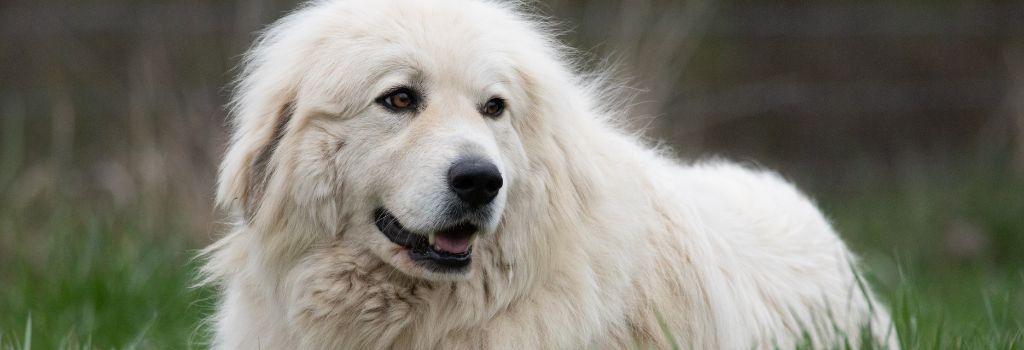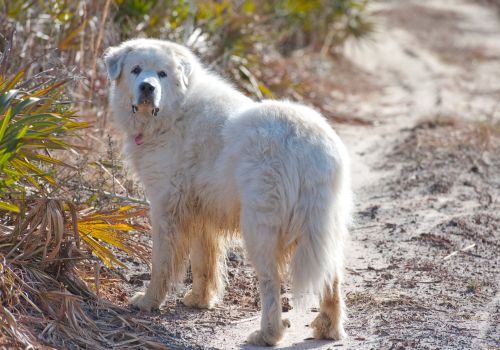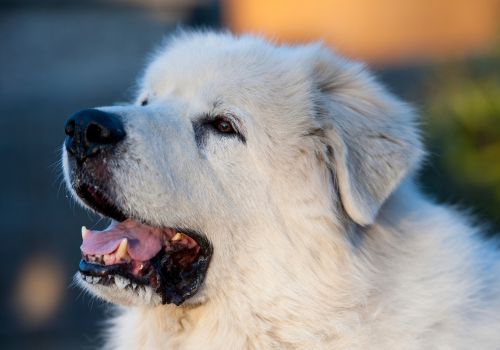The world of a majestic, awe-inspiring breed: the Great Pyrenees. These magnificent dogs are the epitome of a "gentle giant," possessing qualities that make them the ultimate family, companion, or working dog.
Why You Chose Your Great Pyrenees
If you have a "Pyr" in your life, there's a good chance you were drawn to their extraordinary traits. Known for their gentle temperament, these dogs are excellent with children and make dependable family members. They’re confident, steady, and fearless—natural guardians who'll keep watch over your home and your heart.
Did we mention they're intelligent? Pyrs have a sharp mind, making them highly reliable. It's like having a big, fluffy Einstein in your home!
The Adorable Imperfections We Can't Resist
Just like us, our four-legged friends have their quirks. Pyrs, for instance, might be a bit vocal, expressing themselves with barks aplenty. They can also be sensitive souls, taking a bit longer to mature emotionally.
If you're in a hot climate, bear in mind these furry pals prefer cooler temperatures. And speaking of furry, you may want to keep a drool rag handy; these beauties can be a little slobbery. They also can be, let's say, a bit "fragrant" in the gas department.
While they're brilliant, their independent streak might make them a challenging training project. Additionally, Pyrs can be wary of strangers—a characteristic that falls in line with their guarding instincts.

Why We’re Head Over Heels for Our Pyrs
But honestly, who could resist their lovable personalities and loyalty? These big-hearted canines are worth every bit of effort you put into training and socialization. Once you’ve formed a strong bond, you’ll find them to be incredibly calm and patient members of the family.
A Historical Perspective: The Great Pyrenees
Now, let's dig into some history! The Great Pyrenees hails from France and has roots that stretch back to herding and guarding sheep. Named after the majestic Pyrenees Mountains, these dogs were also the chosen guardians of European nobility. Today's Pyrs still have that roaming spirit and protective instinct. Early socialization is key, as is a secure yard or reliable leash to keep those guardian tendencies in check.
So, that's the Great Pyrenees for you! A spectacular combination of brawn, brain, and beauty.

Genetic Predispositions for Great Pyrenees
Bloat: A Time-Sensitive Tummy Tangle
Imagine a balloon inside your Great Pyrenees’ stomach—now imagine it twisted and inflated. Scary, right? That's bloat or Gastric Dilatation and Volvulus (GDV) for you. Pyrenees are especially at risk due to their deep, narrow chests. The twisting of the stomach is incredibly dangerous and can be fatal in as quick as 30 minutes. So if you notice your dog retching, pacing restlessly, or assuming a prayer-like position, rush to an emergency vet pronto! A preventive surgery that tacks the stomach in place can also be a lifesaver.
Bleeding Disorders: The Invisible Risk
Inherited bleeding disorders can be ticking time bombs in dogs like the Great Pyrenees. Von Willebrand's Disease is particularly common in this breed and might only show itself after an injury or during surgery when excessive bleeding occurs. We always test for clotting time or conduct DNA blood tests before any surgical procedure to make sure your Pyrenees isn't at risk.
Wobbler Disease: The Wobbly Walk
If your Great Pyrenees suddenly starts walking like he's had one too many, it could be a neurological condition known as wobbler disease. This happens due to a narrowing of the vertebrae in the neck, affecting the nerves and the dog’s sense of foot placement. Treatment options range from medication to neck braces and sometimes surgery. So if your dog’s back legs start acting funny, or he's stumbling a lot, don't hesitate to seek medical advice.
Bone and Joint Blues: Arthritis to OCD
The Great Pyrenees can be prone to several bone and joint issues, including hip and elbow dysplasia, which lead to arthritis. Watch out for signs of stiffness or lameness, especially as your dog ages. Keeping your pet at a healthy weight can delay the onset of arthritis, and treatments can manage pain effectively. Sometimes conditions like osteochondritis dissecans (OCD) can occur if puppies grow too quickly, necessitating surgery. Regular weight checks and sticking to the recommended growth rate can prevent many of these issues.
Skipping and Hopping: Patellar Luxation
If you see your Pyrenees hop or skip while running, it could be the kneecap slipping out of place, known as patellar luxation. Mild cases may need only arthritis medication, but severe conditions often require surgical intervention to realign the kneecap.
Eo-Pan: The Migrating Leg Pain
Great Pyrenees puppies may suffer from eosinophilic panosteitis, a condition causing painful leg inflammation. Usually appearing between six to ten months, the pain migrates from one leg to another. Though painful, the condition typically doesn't cause permanent damage, but may require pain medication and sometimes rehabilitation exercises.

Cancer: Catch It Early!
Cancer isn't just a human problem; it's a leading cause of death in older dogs too. Pyrenees are more susceptible to certain types of cancer at a younger age, so early detection is crucial. Frequent check-ups, bloodwork, and vigilant observation for lumps can go a long way in catching it early, enhancing treatment success.
Osteosarcoma: The Aggressive Bone Tumor
Osteosarcoma is a particularly aggressive form of bone cancer that often affects large and giant breeds like the Great Pyrenees. If your dog starts limping or showing leg pain, consult your vet immediately for early diagnosis and the best course of action.
Eye Care: Windows to the Soul
From cataracts to other genetic conditions, your Great Pyrenees’ eyes can be susceptible to a range of problems. Some can lead to blindness if left untreated, and many are painful. That's why we always give the eyes a thorough check-up during each visit.
Entropion in Great Pyrenees
Does your Great Pyrenees ever look like he's winking at you a little too much? While it might seem cute, it could be a sign of entropion—a condition where the eyelid rolls inward. It's not just a quirky look; it can be irritating and downright painful as the eyelashes rub against the eyeball. Ouch! And let’s not forget, it could lead to blindness if left untreated. Early surgical intervention is usually successful, so keep an eye out for any signs of discomfort around those beautiful doggy eyes.
Cataracts: Not Just for Humans
Ever looked into your aging Pyrenees’ eyes and thought they seemed cloudy? You're not just seeing things. Cataracts can make your fur baby's eyes appear opaque, impacting vision over time. The good news? Many dogs adapt well to vision loss, and surgery is even an option for restoring sight. So keep those vet appointments for regular eye checks.
Distichiasis: When Extra Hairs Are Not So Extra
Picture this: extra hairs growing inside your dog’s eyelid and scraping against the eyeball. As unsettling as that sounds, Distichiasis is a common hereditary issue in our Pyrenees pals. Early treatment can prevent corneal ulcers and chronic eye pain, so let’s make sure we pluck those unwanted hairs before they become a real pain.
Itchy Paws? Could be Allergies!
If you’ve ever suffered from allergies, you know they're no fun. But did you know that Pyrenees often deal with allergies too? Instead of sneezing and itchy eyes, they get itchy skin—especially around the feet, belly, and ears. If your dog is constantly paw-licking or face-rubbing, it's time to explore some of the many treatment options available.
Heart Disease: Listen to the Beat
Your Pyrenees may have a heart of gold, but that doesn’t make him immune to heart disease. Some issues can affect the heart’s structure, its electrical signals, or even valve function. That's why those vet appointments are so crucial for keeping tabs on your pup's ticker. Special testing could be recommended if you notice unusual symptoms like easy tiring or coughing.

Addison’s Disease: The Sneaky Hormone Imbalance
If your Pyrenees seems off but you can't figure out why, Addison's Disease might be the culprit. This hormone imbalance can mimic many other conditions, making it a bit of a mystery illness. But fear not! With a specialized blood test, diagnosis is straightforward, and treatment can be started to get your pup back on track.
Degenerative Myelopathy: A Challenging Path
Sadly, Degenerative Myelopathy is more common in Pyrenees than in other breeds. Similar to ALS in humans, this neurologic condition affects the hind legs, leading to increasing weakness and even paralysis. While there's no cure, therapies like acupuncture and dietary supplements can make life more comfortable for your beloved pet.
Kidney Disease: Early Detection is Key
Glomerulonephropathy, a big word that can lead to big problems, is an inherited kidney disease that could affect your Pyrenees. Symptoms may not show until kidney damage is significant, so yearly urine analysis is crucial for early detection, easier treatment, and a happier fur baby.
Ear Infections: A Scratchy Situation
Does your dog seem to scratch his ears a lot or shake his head frequently? Ear Infections could be the villain behind this discomfort. Given Pyrenees are often prone to allergies, which can trigger ear issues, it’s a good idea to keep an eye (or an ear!) out for any signs and get treatment ASAP.
Dental Abnormalities: Brace Yourself!
Last but not least, let's talk teeth. Dental abnormalities can happen to any pup, but purebreds like the Pyrenees are especially at risk. From misaligned teeth to missing teeth (known as oligodontia), these issues are often genetic. The good news? Just like in humans, braces are an option for our four-legged friends too!
Don't have a vet in your area yet? We can help you find a local veterinarian.
If you have more questions, the GeniusVets Telehealth platform will give you unlimited access to text and/or video calls with board-certified veterinarians! To learn more click here.


